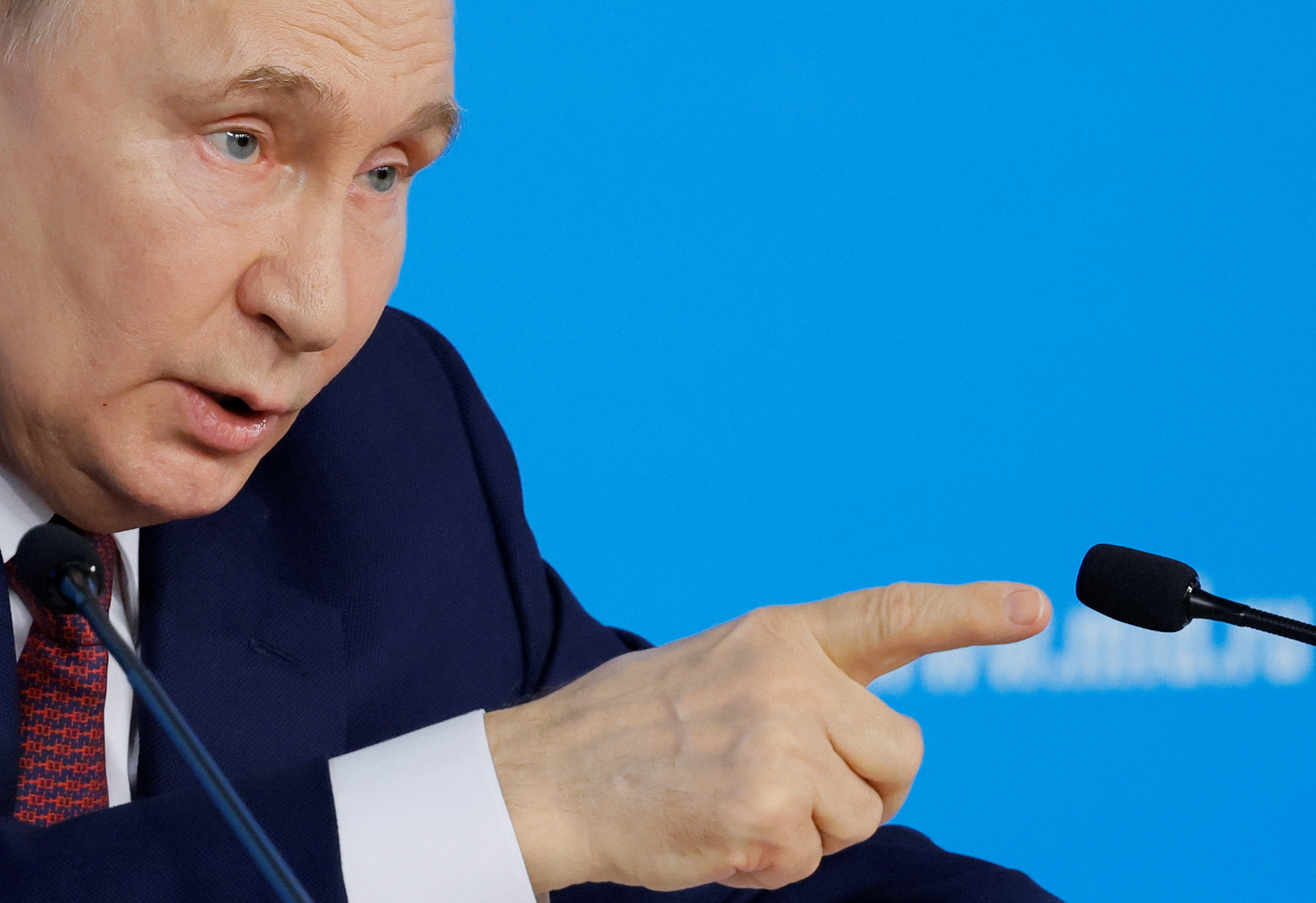World
Putin just reminded the world why Russia must lose

On the eve of last weekend’s Global Peace Summit in Switzerland, Vladimir Putin unveiled a peace proposal of his own. The presentation of this rival peace plan was an obvious attempt to undermine Ukraine’s Swiss initiative, but it also served as a timely reminder that Putin is waging an old-fashioned war of imperial conquest and will continue to escalate his demands until he is defeated.
Putin’s uncompromising vision for a future peace in Ukraine was widely condemned, with Kyiv officials and world leaders rejecting it as an “ultimatum.” Crucially, the terms outlined by the Kremlin leader would leave around twenty percent of Ukraine under Russian control, including significant portions of the country that Putin’s army has so far been unable to capture.
This new peace proposal is the latest example of the growing territorial demands that have accompanied Russia’s ten-year invasion of Ukraine. Time after time over the past decade, Putin has rejected accusations of an expansionist agenda, only to then escalate his invasion of Ukraine further.
Stay updated
As the world watches the Russian invasion of Ukraine unfold, UkraineAlert delivers the best Atlantic Council expert insight and analysis on Ukraine twice a week directly to your inbox.
When Russia first attacked Ukraine in February 2014, Putin insisted Moscow had no territorial ambitions beyond the seizure of Ukraine’s Crimean peninsula. “We do not want to divide Ukraine,” he assured the watching world. Within weeks, however, Kremlin forces posing as locals had sparked a separatist war in eastern Ukraine’s Donbas region.
For the following eight years, Putin steadily strengthened his grip on the so-called “separatist republics” of eastern Ukraine, while consistently denying any direct involvement. The failure of the international community to hold Putin accountable for this shameless duplicity fuelled a sense of impunity in Moscow that set the stage for the largest European invasion since World War II.
In his February 2022 address announcing the full-scale invasion of Ukraine, Putin once again denied harboring any ambitions to annex additional Ukrainian lands. “It is not our plan to occupy Ukrainian territory,” he stated. “We do not intend to impose anything on anyone by force.” Just six months later, Putin demonstrated the true value of his word by solemnly announcing the annexation of four more Ukrainian provinces.
Significantly, the invading Russian army did not fully control any of the Ukrainian provinces claimed by Putin in September 2022. This created a degree of ambiguity regarding the exact geographical extent of Russia’s goals, with Kremlin officials typically limiting themselves to vague calls for Ukraine to recognize the “new territorial realities” created by the front lines of the invasion.
Putin’s new peace plan has now removed all doubt. Indeed, he took special care to clarify that he expects the Ukrainian military to withdraw completely from the four Ukrainian provinces in question, including unoccupied areas. Among other things, this would mean handing over the Ukrainian city of Zaporizhzhia, with a prewar population of more than seven hundred thousand, along with Kherson, which was the only Ukrainian regional capital captured by the Russians before being liberated in November 2022.
Ukraine would also have to voluntarily demilitarize, accept geopolitical neutrality, and submit to “denazification,” Kremlin code for the suppression of Ukrainian national identity and the imposition of a Russian imperial ideology. In other words, Putin is insisting Ukraine admit defeat and surrender.
Eurasia Center events


The terms offered by Putin confirm that he has no intention of reaching a sustainable peace with Ukraine. On the contrary, the Russian dictator evidently remains as committed as ever to his overriding war aim of extinguishing Ukrainian statehood and erasing the Ukrainian nation. As if to underline the point, Putin accompanied his latest demands with a chilling warning that “the existence of Ukraine” depends on Kyiv’s readiness to accept his conditions.
In fact, there is even more at stake than the continued existence of the Ukrainian state. It is no exaggeration to say that the future of global security is currently being determined on the battlefields of Ukraine. If Putin’s invasion succeeds, it will signal the dawning of a new era marked by rising international insecurity, ballooning defense budgets, and increasingly frequent wars of aggression.
A victorious Russia would almost certainly remain at the forefront of this descent into lawlessness for many years to come. Throughout the past decade, Putin has steadily escalated his invasion of Ukraine while shifting his entire country onto a war footing. By this point, it should be painfully clear to all objective observers that he will not stop until he is stopped. Indeed, Putin has openly compared today’s war to the eighteenth century imperial conquests of Peter the Great, and frequently speaks in terms of a sacred mission to “return historically Russian lands.”
As anyone with a passing knowledge of Russian history will confirm, there are at least fifteen other countries beyond Ukraine that were once part of the Russian Empire and therefore meet Putin’s definition of “historically Russian.” All are now potential targets. While it is impossible to know exactly what Putin will do next if he defeats Ukraine, the idea that he will simply choose to stop is perhaps the most far-fetched scenario of all.
Nor will Putin be the only authoritarian ruler looking to embrace a new age of imperial aggression. China, Iran, and North Korea are all already providing the Russian war effort with varying degrees of support, and make no secret of their eagerness to overturn the existing world order. If Moscow achieves an historic victory in Ukraine, Beijing, Tehran, and Pyongyang will also be emboldened, along with a whole host of fellow autocrats throughout the Global South.
The only way to avoid a geopolitical future shaped by rising insecurity and resurgent imperialism is by ensuring Russia loses in Ukraine. Putin’s recent bogus peace proposal is essentially a call for Kyiv’s capitulation and the absorption of Ukraine into a new Russian Empire. This is entirely in line with the policies of escalation he has pursued throughout the past decade, and reflects an imperial agenda that leaves no room for meaningful compromise.
The Russian dictator still clearly believes he can overwhelm Ukraine with brute force while intimidating the wider Western world into inaction. If he succeeds, the consequences for international security will be devastating. Ukraine’s leaders have already responded to Putin’s latest demands with characteristic defiance. Kyiv’s international partners must now go further and provide the military support to secure Ukrainian victory.
Peter Dickinson is editor of the Atlantic Council’s UkraineAlert service.
Further reading
The views expressed in UkraineAlert are solely those of the authors and do not necessarily reflect the views of the Atlantic Council, its staff, or its supporters.


The Eurasia Center’s mission is to enhance transatlantic cooperation in promoting stability, democratic values and prosperity in Eurasia, from Eastern Europe and Turkey in the West to the Caucasus, Russia and Central Asia in the East.
Follow us on social media
and support our work
Image: Russia’s President Vladimir Putin delivers a speech during a meeting with the leadership of the Russian foreign ministry in Moscow, Russia June 14, 2024. REUTERS/Maxim Shemetov










